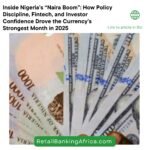Johannesburg, March 28 (Reuters) – The South African rand weakened on Friday as investors reacted to global trade tensions and domestic political uncertainty surrounding the national budget.
As of 1507 GMT, the rand traded at 18.3975 per US dollar, marking a 0.8% decline from its previous close.
US Tariff Uncertainty Weighs on Markets
Markets remain on edge following US President Donald Trump’s announcement of new tariffs on automotive imports, which are set to take effect at midnight on April 3. The proposed tariffs have triggered concerns about their impact on global trade, particularly for emerging market currencies like the rand.
Analysts warn that if the tariffs result in lower global demand for South African exports, the rand could experience further depreciation. The automotive industry is one of South Africa’s largest export sectors, and any restrictions on global trade could affect manufacturing output and employment.
Domestic Political Standoff Over Budget
On the domestic front, tensions between South Africa’s ruling African National Congress (ANC) and the Democratic Alliance (DA) continue to stall approval of the national budget.
The DA has refused to support the budget, demanding shared control over economic policy in exchange for their backing. They are particularly opposing the ANC’s proposed VAT increase, which they argue would place an unfair burden on South African consumers.
According to News24, the ANC has rejected the DA’s proposal, prolonging the political deadlock. Investors remain wary of how the standoff could impact government spending and economic stability in the coming months.
Stock Market and Bond Performance
The uncertainty weighed on South African financial markets, with the Top-40 index (.JTOPI) closing 0.4% lower on Friday.
Meanwhile, South Africa’s benchmark 2030 government bond also weakened, with its yield rising 0.5 basis points to 9.155%, reflecting increased investor caution.
Looking Ahead
With uncertainty surrounding US trade policies and South Africa’s political landscape, the rand could remain under pressure.
Investors will be closely watching:
• Further negotiations between the ANC and DA on the budget.
• US tariff decisions and their impact on global markets.
• Macroeconomic indicators, including inflation and interest rate policies from the South African Reserve Bank.
Should the political impasse persist, South Africa could face credit rating risks, further currency depreciation, and economic slowdown in key sectors.












